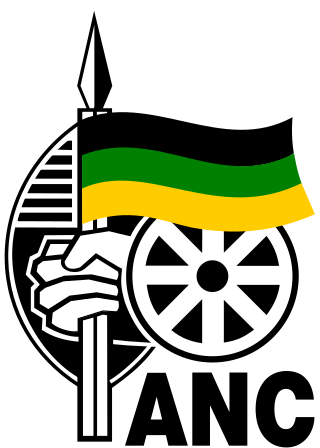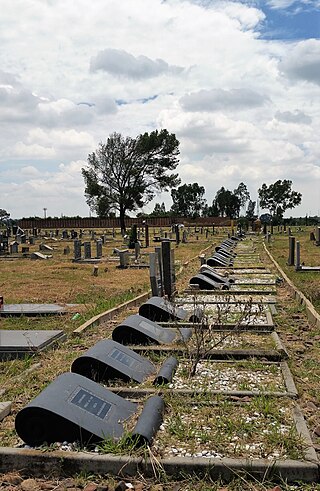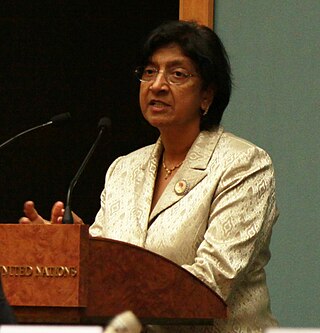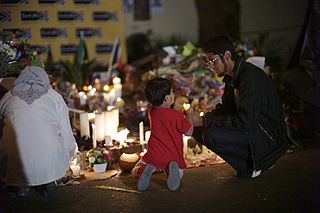
The African National Congress (ANC) is a political party in South Africa. It originated as a liberation movement known for its opposition to apartheid and has governed the country since 1994, when the first post-apartheid election resulted in Nelson Mandela being elected as President of South Africa. Cyril Ramaphosa, the incumbent national President, has served as President of the ANC since 18 December 2017.

Winnie Madikizela-Mandela, also known as Winnie Mandela, was a South African anti-apartheid activist, convicted kidnapper, politician, and the second wife of Nelson Mandela. She served as a Member of Parliament from 1994 to 2003, and from 2009 until her death, and was a deputy minister of arts and culture from 1994 to 1996. A member of the African National Congress (ANC) political party, she served on the ANC's National Executive Committee and headed its Women's League. Madikizela-Mandela was known to her supporters as the "Mother of the Nation".

The South African Communist Party (SACP) is a communist party in South Africa. It was founded in 1921 as the Communist Party of South Africa (CPSA), tactically dissolved itself in 1950 in the face of being declared illegal by the governing National Party under the Suppression of Communism Act, 1950. The Communist Party was reconstituted underground and re-launched as the SACP in 1953, participating in the struggle to end the apartheid system. It is a member of the ruling Tripartite Alliance alongside the African National Congress and the Congress of South African Trade Unions (COSATU) and through this it influences the South African government. The party's Central Committee is the party's highest decision-making structure.

The Day of Reconciliation is a public holiday in South Africa held annually on 16 December. The holiday came into effect in 1995 after the end of apartheid, with the intention of fostering reconciliation and national unity for the country. Recognising the need for racial harmony, the government chose the date for its significance to both Afrikaner and indigenous South African cultures. The celebration of the Day of Reconciliation can take the form of remembering past history, recognising veteran's contributions, marching, and other festivities.

The Sharpeville massacre occurred on 21 March 1960 at the police station in the township of Sharpeville in the then Transvaal Province of the then Union of South Africa. After demonstrating against anti-black pass laws, a crowd of about 7,000 black protesters went to the police station. Sources disagree as to the behaviour of the crowd: some state that the crowd was peaceful, while others state that the crowd had been hurling stones at the police and that the mood had turned "ugly". The South African Police (SAP) opened fire on the crowd when the crowd started advancing toward the fence around the police station; tear-gas had proved ineffectual. There were 249 victims in total, including 29 children, with 69 people killed and 180 injured. Some were shot in the back as they fled.

General elections were held in South Africa between 26 and 29 April 1994. The elections were the first in which citizens of all races were allowed to take part, and were therefore also the first held with universal suffrage. The election was conducted under the direction of the Independent Electoral Commission (IEC), and marked the culmination of the four-year process that ended apartheid.

Helen Suzman, OMSG, DBE was a South African anti-apartheid activist and politician. She represented a series of liberal and centre-left opposition parties during her 36-year tenure in the whites-only, National Party-controlled House of Assembly of South Africa at the height of apartheid.

Ahmed Mohamed Kathrada OMSG, sometimes known by the nickname "Kathy", was a South African politician and anti-apartheid activist.
1994 in South Africa saw the transition from South Africa's National Party government who had ruled the country since 1948 and had advocated the apartheid system for most of its history, to the African National Congress (ANC) who had been outlawed in South Africa since the 1950s for its opposition to apartheid. The ANC won a majority in the first multiracial election held under universal suffrage. Previously, only white people were allowed to vote. There were some incidents of violence in the Bantustans leading up to the elections as some leaders of the Bantusans opposed participation in the elections, while other citizens wanted to vote and become part of South Africa. There were also bombings aimed at both the African National Congress and the National Party and politically-motivated murders of leaders of the opposing ANC and Inkatha Freedom Party (IFP).
The Anti-Apartheid Movement (AAM) was a British organisation that was at the centre of the international movement opposing the South African apartheid system and supporting South Africa's non-White population who were persecuted by the policies of apartheid. The AAM changed its name to ACTSA: Action for Southern Africa in 1994, when South Africa achieved majority rule through free and fair elections, in which all races could vote.

The International Day for the Elimination of Racial Discrimination is observed annually on 21 March since declared by the United Nations in 1966. In South Africa, the country in which the event took place that gave rise to the observance, the Sharpeville Massacre, the day is commemorated as Human Rights Day, and is a public holiday.

A referendum on becoming a republic was held in South Africa on 5 October 1960. The Afrikaner-dominated right-wing National Party, which had come to power in 1948, was avowedly republican and regarded the position of Queen Elizabeth II as the South African monarch as a relic of British imperialism. The National Party government subsequently organised the referendum on whether the then Union of South Africa should become a republic. The vote, which was restricted to whites—the first such national election in the union—was narrowly approved by 52.29% of the voters. The Republic of South Africa was constituted on 31 May 1961.

Apartheid was a system of institutionalised racial segregation that existed in South Africa and South West Africa from 1948 to the early 1990s. Apartheid was characterised by an authoritarian political culture based on baasskap, which ensured that South Africa was dominated politically, socially, and economically by the nation's minority white population. In this minoritarian system, there was social stratification, where white citizens had the highest status, followed by Indians and Coloureds, then Black Africans. The economic legacy and social effects of apartheid continue to the present day, particularly inequality.

The apartheid system in South Africa was ended through a series of bilateral and multi-party negotiations between 1990 and 1993. The negotiations culminated in the passage of a new interim Constitution in 1993, a precursor to the Constitution of 1996; and in South Africa's first non-racial elections in 1994, won by the African National Congress (ANC) liberation movement.
South Africa since 1994 transitioned from the system of apartheid to one of majority rule. The election of 1994 resulted in a change in government with the African National Congress (ANC) coming to power. The ANC retained power after subsequent elections in 1999, 2004, 2009, 2014, and 2019. Children born during this period are known as the born-free generation, and those aged eighteen or older, were able to vote for the first time in 2014.

The African National Congress (ANC) has been the governing party of the Republic of South Africa since 1994. The ANC was founded on 8 January 1912 in Bloemfontein and is the oldest liberation movement in Africa.

Nelson Rolihlahla Mandela was a South African anti-apartheid activist, politician, and statesman who served as the first president of South Africa from 1994 to 1999. He was the country's first black head of state and the first elected in a fully representative democratic election. His government focused on dismantling the legacy of apartheid by fostering racial reconciliation. Ideologically an African nationalist and socialist, he served as the president of the African National Congress (ANC) party from 1991 to 1997.

On 5 December 2013, Nelson Mandela, the first President of South Africa to be elected in a fully representative democratic election, as well as the country's first black head of state, died at the age of 95 after a prolonged respiratory infection. He died at around 20:50 local time (UTC+2) at his home in Houghton, Johannesburg, surrounded by family. His death was announced by then President Jacob Zuma on national television at 23:45. Reactions from governments, international organizations, and notable individuals, gained worldwide media coverage.
Chris Hani, General-Secretary of the South African Communist Party (SACP), was assassinated by right-wing extremist Janusz Waluś on 10 April 1993. The assassination, later tied to members within the Conservative Party, occurred outside Hani's home in Dawn Park during a peak period of progressive anti-apartheid momentum in South Africa. After the assassination, racially fuelled riots drew international attention to the instability of the political division within South Africa, leading to an inclusive national democratic election in April 1994, won by the African National Congress (ANC). Waluś and his accomplice Clive Derby-Lewis were sentenced to death after their arrest in 1993; the sentence was later commuted to life imprisonment.
The 48th National Conference of the African National Congress (ANC) took place from 2 to 7 July 1991 at the University of Durban–Westville in Durban, KwaZulu-Natal. It was the first national conference of the ANC since the organisation was banned by the apartheid government in 1960 and marked the ascension of Nelson Mandela to the ANC presidency, which since 1967 had been held by Oliver Tambo.















